
My Tartine tale (a photo heavy post)
Now that my baby starter is quite active and I've had a few successful naturally leavened loaves, I wanted to try making some Tartine bread. I dined at Bar Tartine recently and the idea of baking my own oat porridge bread was stuck in my head. I used breaducation's formula for the Tartine oat porridge bread.
Let's just say mine turned out nothing like breaducation's beautiful bread. My dough was very wet and sticky and I had trouble handling it. You can see that my loaf hardly rose at all.
Even though it was more pancake than bread, the flavor was very good. In fact, the flavor was very close to the porridge bread they sell at the bakery. I could taste the oatmeal and it had that sourness I've been trying to achieve in my breads.
Thinking that the oat porridge may have been too ambitious, I tried the Tartine basic country bread recipe instead. This did not go so well either. I think I see the Batmobile parked in there.
After searching for clues on TFL, gluten underdevelopment was the most likely culprit. Even though I bulk fermented at room temp (70F) for 3.5 hours with 5 stretch-n-folds during the first 2.5 hours, I was making the newbie mistake of watching the clock instead of watching the dough.
I vowed to be patient during my next attempt at the Tartine basic country. I bulk fermented until the dough volume had increased by at least 30%, the top of the dough was slightly domed not flat, and I could see bubbles along the sides of my container. This took 5 hours at 70F.
My patience really paid off!
I even made pizza with some of the dough.
I hoped that my success wasn't just a fluke. I made another batch of dough the next day.
This time the crumb was even better than in the previous bake.
The take away message is "Watch the dough, not the clock".
:) Mary
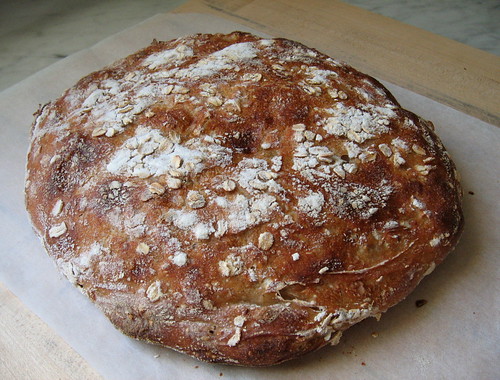
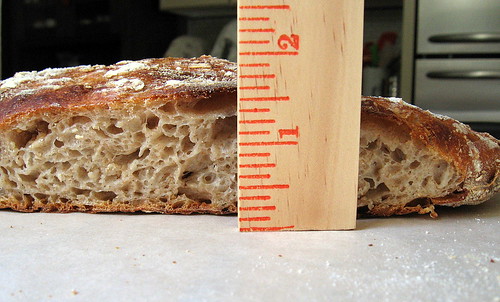
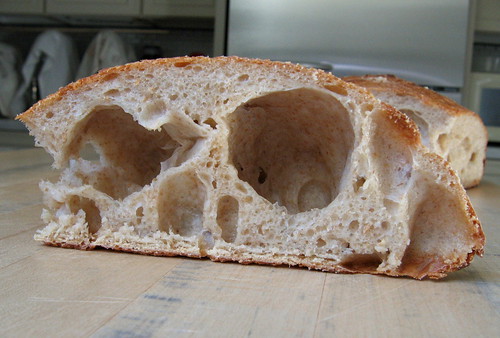
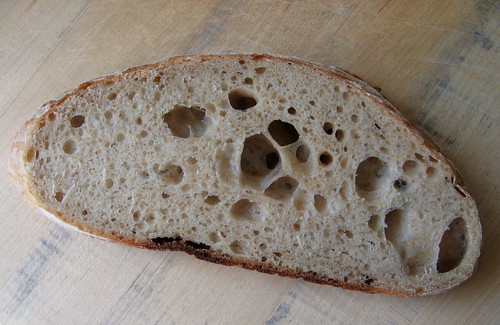
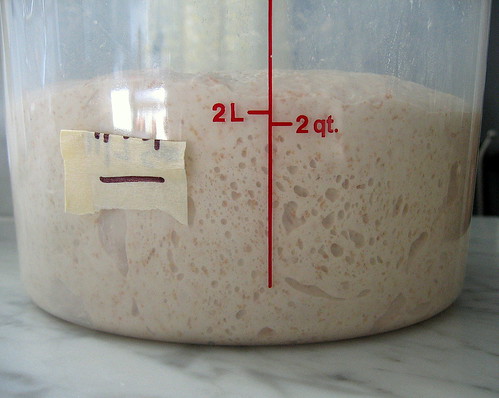
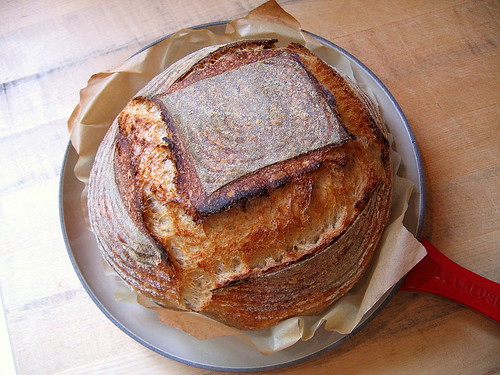
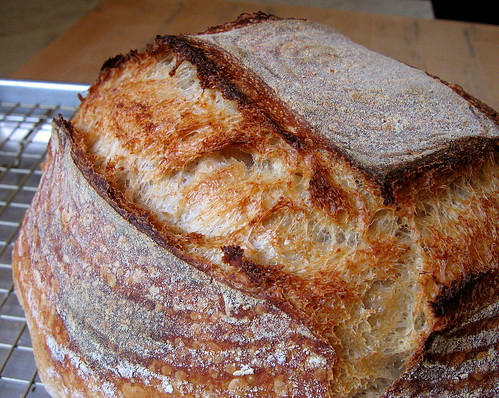
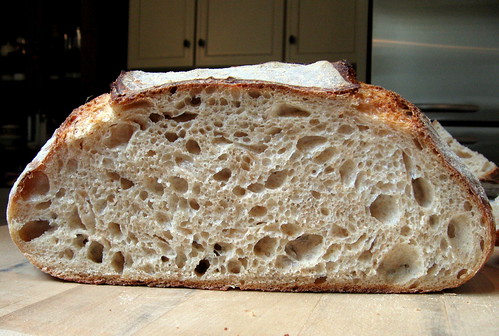
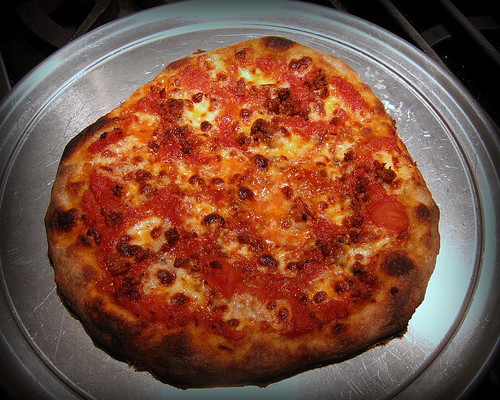
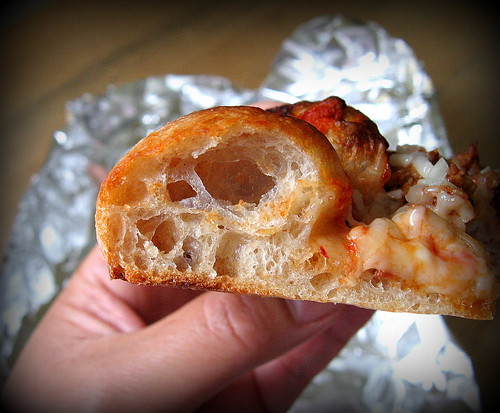
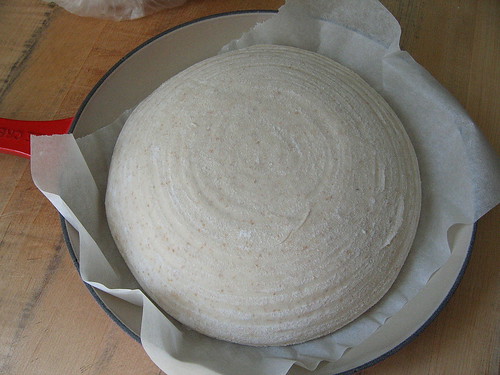
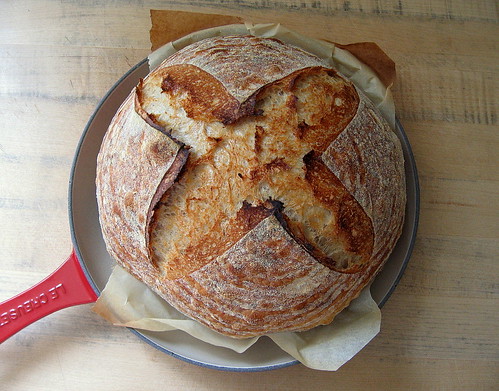
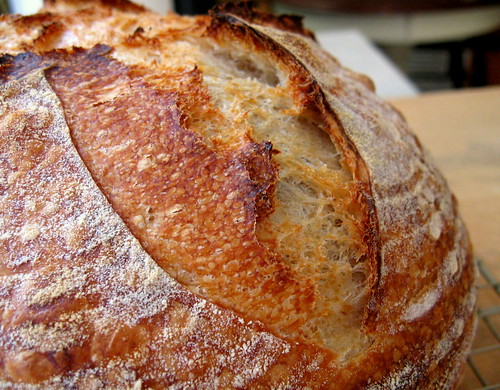
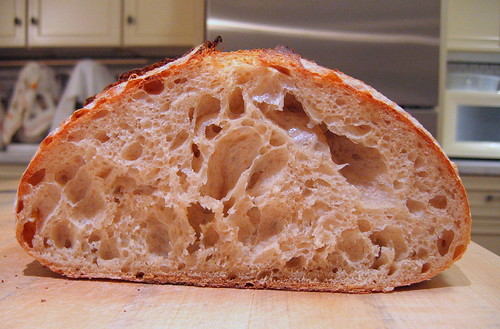
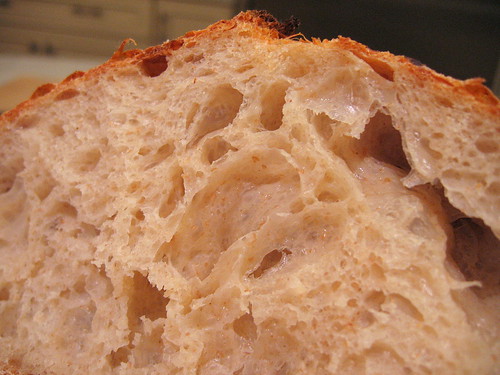
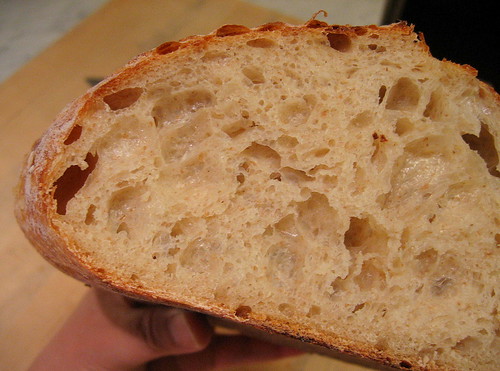


Comments
Beautiful scoring and beautiful bread.
And the pizza crust looks perfect!
David Esq - I've had the Tartine Bread book for years, but I never considered trying the pizza recipe until I saw your recent post on pizza made with the basic country dough.
I'm envious. That looks fantastic.
ericreed - Thanks! I surprised myself when the bread came out so well.
much just a few degrees in temperature makes in the activity and speed of the dough. The pizza and bread look great. Looks like it is time to get back to the porridge bread?
Happy Baking
dabrownman - It is quite amazing the difference in activity at 70F (my room temp) vs 78-82F (Chad's room temp). I will have to try the oat porridge bread again now that I know what I did wrong the first time.
I really like how that looks. What is the scoring method for such a nice butterfly? I see butterfly, others may see a cross, or even a ghost. :)
David Esq - I used a 3-inch paring knife to score. I cut straight down with the blade instead of holding the blade almost parallel to the surface of the dough.
And a great reminder on what to watch :)
Maine18 - There are so many little details to remember, but I am slowly getting the hang of this bread thing.
Beautiful boules!
Once again, you have demonstrated ...
Happy baking!
David
David S - I attribute much of my success with baking bread to the wonderful advice and inspiration from you and other TFLers. Even though I'm only a few weeks into my bread journey and have yet to fully develop my bread baker's intuition, I thought I would pay it forward and post my "lightbulb moment" about watching the dough.
Great job on both the Tartine loaf and the pizza crust. Both look absolutely perfect.
The Tartine formula takes some work and getting the hang of...but the great pay off is now you will most likely be able to have that great bread whenever you want, AND make it turn out.
Happy baking.
John
Thanks John. All I wanted to achieve when I started baking bread was to make something close to the Tartine bread so I could stop buying it. :)
Great job. It's nice to persevere and get the results you are looking for. For the porridge bread you may need to adjust the water and/or flour based on your humidity and the type of flour you use. I have learned the hard way to trust my instincts...if you think it is too wet....it usually is and you need to adjust. I am pretty good at working with wet doughs, but sometimes unless you want a Ciabatta you need to adjust so you have a workable dough.
I'm going to try the porridge bread myself soon and will let you know how I fare.
Regards,
Ian
Thanks for the kind words, Ian. I guess I should've added a bit more flour when the porridge bread dough was still so wet. Live and learn.
Wow! great post.
Thanks bbegley.
The bread looks great nice crust will you please share recipe in cups tbs and tsp
Thank you
chefscook
And you blogged about it here.
That is, if you are asking about her successful bake of the Tartine Basic Country Loaf.
Hi chefscook,
The Tartine basic country bread formula is:
90% AP or bread flour (11.5-12.5% protein level)
10% whole wheat flour
75% water
2% salt
20% young liquid levain
(For example, 900g flour, 100g whole wheat flour, 750g water, 20g salt, 200g levain)
I don't have tsp, tbsp and cup measurements since I only bake bread using weight measurements. I'm sure you can Google for the conversion. However, generally speaking, using volume measurements like cups and tsp, etc. can be inaccurate since the way a person scoops flour into their measuring cup can vary.